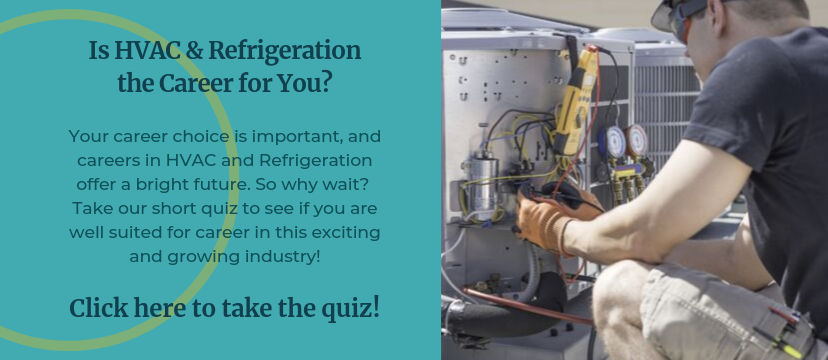There was a time when high paying jobs for women without a degree were limited. But today the doors are open wide, including in the traditionally male field of HVACR.
Thanks to advocacy, recruitment, and an emphasis on STEM (science, technology, engineering, and mathematics) education, today more women are entering the profession as HVACR technicians.
In fact, the increase in the number of women who have joined the HVACR industry led to the formation of a national organization called Women in HVACR. It was created to provide education, mentoring, networking, and other resources for women in this field.
So, what makes HVACR such a good source of jobs for women without a degree?
The outlook in HVACR jobs for women without a degree
HVACR specialists handle the installation, repair, and maintenance of heating, ventilation, air conditioning, and refrigeration equipment. Although women make up about 47% of the total U.S. workforce, they currently account for only about 2% of the HVACR trade.
However, there are many opportunities for women in HVACR, both now and in the foreseeable future.
According to the U.S. Bureau of Labor Statistics (BLS), jobs in the HVACR industry will grow 13% from 2018 to 2028. That will increase the demand for qualified service technicians in an industry that already has a shortage of skilled workers.
In addition, according to the Social Security Administration, about 53% percent of workers in the skilled trades (such as HVACR) are over age 45, and nearly 19% percent are 55-64. Some states will be especially hard hit:
- More than 60% percent of skilled trades workers in New Jersey, Connecticut, Rhode Island, and New Hampshire are 45 or older
- More than 57% in New York, Pennsylvania, Delaware, Illinois, Ohio, and Maine are 45 or older
With the aging of the current HVACR workforce and the odds that many will retire in the next decade, the industry could be seriously understaffed despite the growing demand for its services. That means there is an incentive for employers to attract more women to fill the need for skilled HVACR professionals.
Bringing more women into the HVACR field will not only help to ease the labor shortage — it will also bring a new generation into the trade, which in turn encourages innovation and new approaches to the work.
Typical wages in HVACR
With the high cost of 4-year colleges, there is a growing interest in careers that emphasize having the right skills over having a degree. Today, the HVACR industry and organizations such as Women in HVACR are actively promoting the profession as a source of high paying jobs for women without a degree.
As with many other job wages, HVACR technician salaries vary — not based on gender, but according to a lot of other different factors, such as:
- Training and credentials
- Industry or employer
- Success and performance
- HVACR skills and experience
- Job responsibilities
- Geographic location
However, according to the BLS, the median annual wage for HVACR mechanics and installers was $47,610 in May 2018. The highest 10% of those HVAC workers earned more than $76,230. (Read more BLS pay statistics here.)
HVACR jobs for women without a degree offer full-time employment opportunities and steady work year-round. While a technician might need to be on call and work overtime or odd hours during busy heating and cooling seasons, those OT hours mean more opportunities to earn.
Here in the New York City area, a union service technician in her second year can earn over $40,000 working full time, even without overtime. The earnings potential grows to $100,000 or more within 5 years.
In addition, a qualified HVACR technician who continues to build her skills, through both additional training and on-the-job experience, bring more value to the job — increasing her earning potential.
How to get started as an HVACR technician
Becoming an HVACR technician is a great career choice for women who are motivated, hardworking, interested in doing technical work, and good with people. Most jobs in the HVACR field do not require a 4-year college degree.
In fact, someone with a GED or high school diploma can often get an entry-level position as an apprentice or a helper at an HVACR company. Once she gets her foot in the door, the apprentice/helper gets hands-on experience and is trained on the job by her employer or union.
Additional HVACR training for women is also available through sources like technical or trade schools, certificate programs, and online schools. Some HVACR companies, as well as organizations such as Women in HVACR and government programs, offer grants and scholarships to women who are looking for training in the industry. (Read more about HVACR scholarships for women.)
Some of the more high paying jobs for women without a degree
For skilled HVACR workers who gain more experience, there are many opportunities for career growth and higher pay.
For example, a technician can earn more as an expert in specialized areas of the business, such as AC, refrigeration, or ventilation installation and repair. Field technicians can also increase their earnings, and still play a role in the technical aspects of the job, by moving into supervisory or project management positions. The push toward green technology and greater energy efficiency can open career doors for technicians who are interested in this growing area of specialization.
In addition, women are making advances as managers, directors, CEOs, and owners of HVACR companies, setting high standards as leaders in the industry. Two examples in the New York City area include Nancy Falco, General Manager of the BP Group, and Yvette Soto-Gitelman, Vice President of Finance and Administration at Arista Air Conditioning.
In fact, with the growing need for skilled, determined, and dedicated technicians in HVACR, there is really no limit to the possibilities of high paying jobs for women without a degree.
So, whether you are just out of high school, dissatisfied with your current situation, searching for something that is challenging and hands-on, or looking to change from a job to a career, consider the many options in HVACR.
Take our quiz to find out if a career in HVAC service is right for you.

